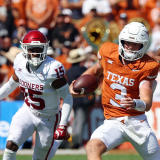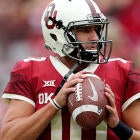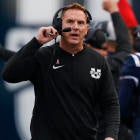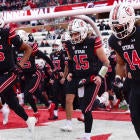The adults seem to be losing supervisory privileges over the transfer process. No matter what you may read about transfers' new-found freedom, there is still an underlying and remaining unfairness for the kids.
That was proved once again in less than a 12-hour period Wednesday. It was reported by CBS Sports and others that graduate transfer quarterbacks Austin Kendall of Oklahoma and Alex Delton of Kansas State planned to transfer to other schools within the Big 12.
Elsewhere in the mysterious transfer portal, Jalen Hurts went Oklahoma, Kelly Bryant left for Missouri, and Justin Fields enrolled at Ohio State.
Good. Fine. Fair.
At issue is the transfer reform enacted last year did not impact the ability for originating schools to prevent graduate transfers from becoming immediately eligible at their new schools.
In such cases, players would have to sit out a year. In the case of some intraconference transfers like Kendall and Delton, the players would have also lost a year of eligibility.
Kendall and Delton were "blocked" -- at least for a few hours – from becoming immediately eligible at West Virginia and TCU, respectively, over competitive reasons. It was petty.
Oklahoma didn't want its backup quarterback, who had thrown all of 39 career passes, playing against it at WVU. (Kendall has yet to formally decide his transfer destination.) Never mind new coach Neal Brown had a relationship with Kendall having recruited him at Troy. K-State didn't want Delton, he of six career starts in four seasons, lining up against it at TCU.
See what I mean? Petty.
"It's like your ex-wife determined who is your next wife," a legislative source told me last June.
Thankfully -- literally at the end of the day -- Oklahoma and Kansas State cleared the way for Kendall and Delton, respectively, to be eligible immediately at their Big 12 programs of choice.
If reporting on the restrictions and the ensuing reaction to them had something to do with those change of hearts, well, good.
These players had fulfilled their obligation to their school, their conference, the NCAA and themselves. They graduated.
If it's really about that educational experience that the NCAA keeps telling us about, their remaining eligibility should have been a decision that was theirs and theirs alone.
If it's not, please coaches and athletic directors, quit hitting us with those sterling grade-point averages and honors rolls because it smacks of duplicity.
OU and KSU were basically Twitter-shamed into doing the right thing.
Reactions from the Twitter mob to those players being restricted ranged from the hypocritical ...
It’s funny how coaches can leave to another school in a heartbeat without saying a word to any of the players. But as soon as a player does the same they hate on you for it. They block you from which schools you can go to and all this other stuff. It’s funny 😂
— Chuba Hubbard (@Hubbard_RMN) January 16, 2019
... to the bohemian ...
These things never end well. pic.twitter.com/XyCv3Y1ogo
— Derek Cox (@DACox17) January 16, 2019
The reports begat fan outrage, and our old friend Twitter was more than happy to carry the bile.
If that's what it takes to combat unfair practices, fine.
As stated, the adults aren't doing the kids much of a service. The coaches too often lower themselves to childish levels. They have used inflammatory words like "free agency." Transfer reform is not that, by the way.
Yes, Alabama's Hurts could have transferred to Auburn, but so what? It's football, not an armed conflict.
ESPN's Jay Bilas met a great point related to rival coaches changing jobs.
So, a player shouldn’t be immediately eligible at a school in your league or on your schedule because they have inside info on your program? But, this is fine. https://t.co/qdVeY6EqIN
— Jay Bilas (@JayBilas) January 16, 2019
It needs to be restated that coaches (and assistant coaches) can move around as they please for as much as they can earn. It's just that schools were Twitter shamed in a matter of hours breaking -- for the moment -- a half--century tradition of servitude.
In the 1960s, the NCAA established that academic "year-in-residence" for transfers that had the actual effect of intimidating enough athletes to stay put.
Oklahoma and K-State relented, and that's all the matters.
No, this did not compare much to Oklahoma pushing for another year of eligibility for Baker Mayfield in 2016. Mayfield had already sat out a year. The Big 12 changed its rules in that specific case, coming to the realization the chances of another walk-on becoming a Heisman Trophy finalist anytime soon were remote.
Back to present day. When the transfer portal was established last year and undergraduates were allowed to post their names without their originating schools able to block or restrict destinations, it was considered a watershed moment.
Except … it didn't go far enough. It didn't change the fact that graduate transfers are allowed a one-time transfer exception unless … well, unless for just about anything. Schools can block graduate transfers from immediate eligibility at their new school for just about any reason: spite, meanness, control.
It's on the graduate transfer to apply for a waiver. With a soft deadline for such dealings coming up on Monday, the likes of Kendall and Delton were being backed into a corner. In fact, Delton would have run out of eligibility if he was wasn't released.
Why doesn't every league follow the SEC's example? We tend to pile on the league for being football first, but the SEC passed a proposal last year that allowed graduate transfers to move within the conference immediately and without restriction.
In blocking the immediate eligibility for graduate transfer lineman Brandon Kennedy last year, Nick Saban said, "When we make a rule that guys can transfer whenever they want to transfer, how are we supposed to get people to do what they should do?"
"… do what they should do."
Yikes! Kennedy had graduated in December 2017. He had two years eligibility remaining. He had more than fulfilled his obligation to his school, his conference, the NCAA and himself.
Saban had used a similar graduate transfer with two years of eligibility to win a national championship. Remember QB Jake Coker?
This is just one reaction from one of the adults who are supposedly in charge. The kids? The kids are all right.
















